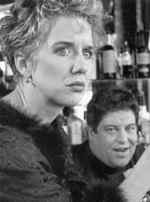FOR THE LAST five years, there have been two Lauren Weedmans in Seattle. Soon there won’t be any. It doesn’t seem fair.
The first Lauren Weedman is the sensitive, imaginative writer-performer of the solo shows Homecoming, HuuI, and If Ornaments Had Lips. The other Lauren Weedman is the droll comedienne-chanteuse who’s brightened many a theatergoer’s evening in Empty Space comic pastiches like The Salvation of Iggy Scrooge and Wuthering! Heights! The! Musical! And after the run of their joint creation Amsterdam, both Lauren Weedmans are departing for more spacious, if not greener, pastures—and, if there is any justice, fame and fortune.
At the time she first grabbed our attention back in April 1997 at On the Boards with Homecoming, many local “performance artists” were ready and only too willing to recycle their lives, opinions, and inner wounds for public consumption. But Weedman’s very first outing set her apart from that pack. It didn’t so much explore the impact of half a dozen strong-minded women on the making of the performer as disclose them still battling for center stage in her psyche.
Homecoming was rickety in construction and uncertainly paced, but so sure about where it was coming from and where it was going that the bumps in the road didn’t matter. Above all, though still in textual flux, it was written. Watching it, you didn’t think of other solo this-is-my-life-just-look-at-it artists like Paula Poundstone or Sandra Bernhard but of authors like Eudora Welty or even Flannery O’Connor, writers whose own personal and pungent style didn’t mask the vivid idiosyncrasy of their characters.
Working with other people’s material, the other Lauren Weedman was easier to categorize: a singin’, dancin’, funny lady, born to play those comic second leads like Show Boat‘s Ellie May, Oklahoma‘s Ado Annie, and, with a few more years on her, headline turns like Dolly Levi and Mama Rose. None of the local fans who saw her in Eddie Levi Lee’s Empty Space musicals will be surprised at Weedman’s decision to look for her Big Break in New York rather than Los Angeles.
BUT THE BIG BREAK in question is not, as it has been for performers with Weedman’s gifts for the better part of a century, to star on Broadway. Even 25 years ago, Liza Minelli’s motto “If I can make it there, I’ll make it anywhere” was already dubious (New York, New York was, after all, a movie musical)—today, it’s simply not so. A performer can have the New York critics at her feet and still be considered a totally unknown quantity until she’s passed the cinematic acid test.
To get a toehold in today’s film industry, a woman must be either drop-dead gorgeous or jailbait, preferably both. Weedman is neither. Any LA casting agent would send her out on funny-neighbor-on-a-sitcom calls or nothing. In New York, where live performance still pays off in cachet if not in groceries, her chance for the kind of Big Break her talents are due is far better.
Particularly in the ill-defined genre where she shines: Thanks to autobiographical monologists like Spalding Gray, satirical sketch-comedians like Eric Bogosian, and engaged journalist-performers like Anna Deavere Smith, audiences have never been better for solo performers or more willing to go in whatever direction the performer wants to take them. One of Weedman’s deepest early influences was the phenomenally gifted Whoopi Goldberg. She sees Goldberg’s loss of focus and force with every step toward greater celebrity in the light of a terrible warning. But she’s also kept an eye on the slow but incremental success of Danny Hoch, sticking to his own experience as an ethnically disadvantaged white boy for raw material while constantly working to deepen its impact and generalize its significance.
In one way, Weedman’s latest show, Amsterdam, is a step away from her long-term career goal. For one thing, it’s “a musical”—though not what Rodgers and Hammerstein would recognize as one—and both Weedman and her composer-performer collaborator James Palmer claim not to like musicals. But like ’em or not, few Americans fated for a life in performance fail to take advantage of the annual musical as an escape from the routine repression of high-school life. The seeds are planted, though they may well, as with Amsterdam, bear strange and twisted fruit when they sprout at last.
Even among today’s revisionist musicals, Amsterdam stands apart. Beppi, the burnt-out Teutonic rocker-babe we first see propping up the bar, is part of the story line, but she, along with her two-man band the Boys (Palmer and drummer Ron Carnell), is also a dramatic device: a way to frame the experiences of Dani, an American girl looking for realer reality in the European capital of dreams. Once she’s got them on stage, Weedman takes advantage of the Boys to provide both musical and verbal accompaniment as she alternately inhabits the brains of Beppi, Dani, Dani’s Dutch boy friend, and others encountered along her way.
Weedman counts a stay in freewheeling, brain-bending Amsterdam as an important influence on her life, but says that the figures who inhabit this play are more “invented,” less renditions of pieces of the author’s own psyche and past than in her previous work. Still, it’s Weedman who invented and embodies them, and to be present as she does so is a rare privilege.








